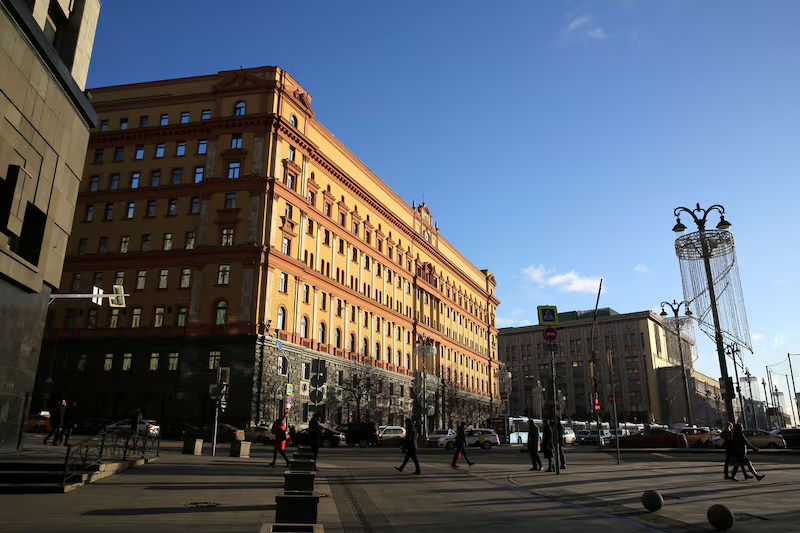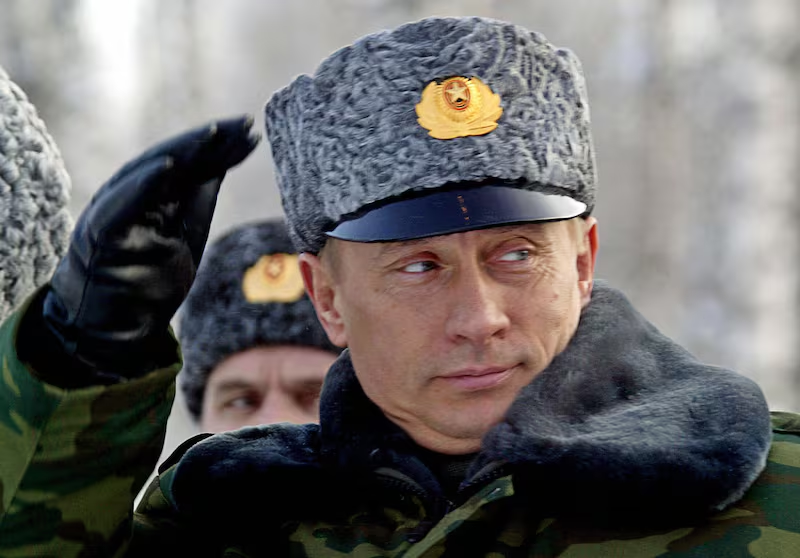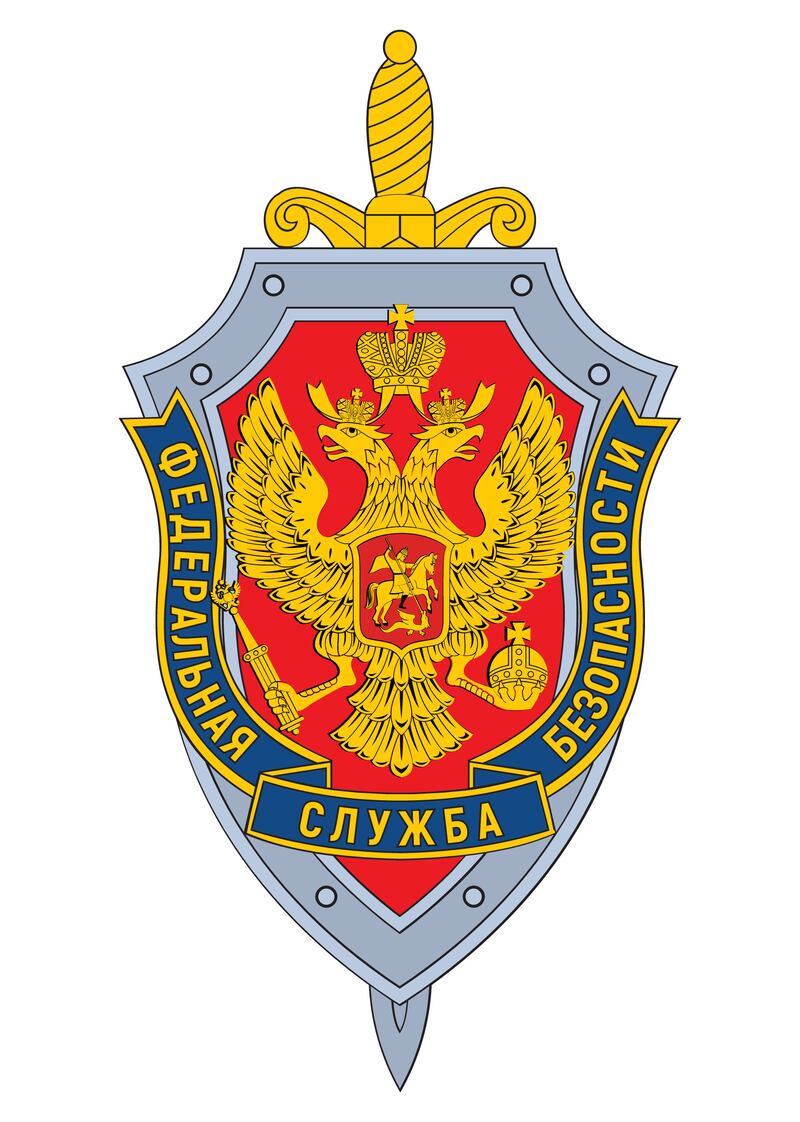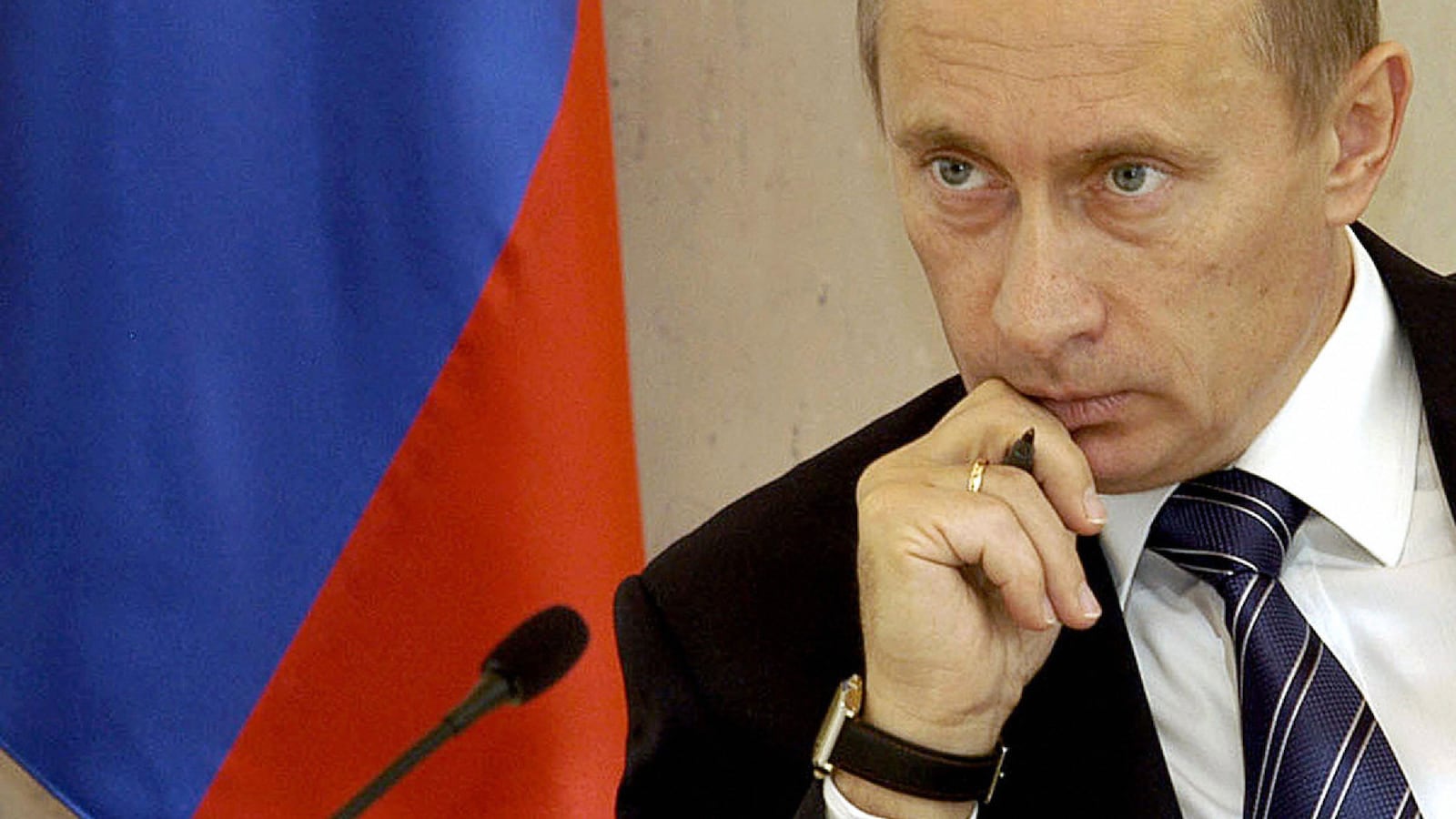It was the height of summer in Moscow, and the offices around the city were suffering from the heat, including an attic of a five-story building in the old and prestigious district of Arbat. The attic was home to the weekly newspaper Versia, which had a rather scandalous reputation. It was 2002, and I headed the national security department. Staffed with reporters in their mid-twenties, our beat was the Russian security services. Many in the ranks of Russia’s counterintelligence agency FSB and the intelligence service SVR loved reading Versia. The owner of the newspaper was a beautiful woman with a soft spot for large American SUVs and long black mink coats. A photograph of her with the director of the FSB held pride of place on the wall in her office.
Vladimir Putin had been in the Kremlin for almost two years, and he made it very clear he wanted his colleagues from the state security organs gaining more of a presence among the great and the good of Russian society. What these spies and counterspies were up to, however, was not very clear, and that made the topic of security services so fascinating for our department, which in turn made our department central to Versia's editorial mission.
One day a letter addressed to me landed on the desk of a receptionist in our little attic. It was a white envelope with no name on it. Inside, there was a sheet of paper with a short note, just the three paragraphs, written in typespace, with no signature:
“According to the law on the FSB, one of the main jobs of the FSB is to conduct intelligence activities (Article 8). According to the Decree of the President of the Russian Federation of 1999, the External Intelligence Bodies of the FSB of Russia were set up for these purposes (it sounds like nonsense, but in fact, it is the usual competition between intelligence services within the country and abroad).”
The anonymous author of this cryptic missive—equally stilted in the Russian bureaucratic manner, but with his or her own inside commentary—went on to explain that the name given to the body overseeing the External Intelligence Bodies of the FSB was the Operational Information Coordination Directorate (UKOI). The chief was Vyacheslav Ushakov, a protégé of Putin. He had been called from retirement in the late 1990s when Putin became the director of the FSB, and his appointment to this newly minted intelligence body was significant.
Russia already had two foreign intelligence agencies: the GRU, the military intelligence service which had run uninterrupted from the days of the Bolsheviks all through the Cold War and now into the post-Soviet period; and the SVR, the successor to the First Chief Directorate of the KGB. Why create a third within the FSB, the domestic intelligence agency mostly focused on counterterrorism and counterintelligence? The reason, our anonymous letter-writer stated, was deeply rooted in the aftermath of the collapse of the Soviet Union.

The headquarters of the Russian Federal Security Service in Lubyanskaya Square in central Moscow.
Maxim Churusov\TASS via GettyRussia’s security services sought to maintain special relationships with the former Soviet republics (outside the Baltics), even helping them to fill the vacuum in their own security structures. In April 1992, the SVR signed an agreement with its counterparts in these countries, which included Ukraine, Georgia, and Belarus and Central Asian stans, agreeing not to spy on each other. The FSB, however, never signed any such agreement and felt free from any such obligations.
Besides, the FSB argued, the agency had in fact some intelligence facilities inherited from the KGB. In Soviet times, intelligence and counterintelligence branches of the KGB were closely interconnected. In addition to its espionage abroad, the KGB was always busy collecting “intelligence from the territory,” a euphemism for recruiting foreign nationals in the Soviet Union, with an eye to subsequently running them as agents in their home countries. Regional departments of the KGB were tasked with recruiting foreigners traveling throughout the country.
Each regional department had what was called a First Section in charge of dealing with foreigners. So when an American student came to Moscow to study Russian, the local KGB branch kept tabs on him or her, waiting for a good moment to approach and recruit.
When the KGB was dismantled and divided up, the First Sections were left at the FSB’s disposal, having maintained their functions. But they lacked the overarching coordination. This lack of an umbrella organization was used by the FSB as a pretext to create a department by which it could dramatically expand its reach. The existence of first sections and the apparent intelligence vacuum in the post-Soviet republics provided the opportunity: the FSB’s new directorate was tasked by the Kremlin with spying on Russia’s nearest neighbors.
The author of the letter was certain that the main reason for the emergence of the directorate was a bureaucratic desire to create more positions for generals. Our sources in the Lubyanka, the FSB headquarters, agreed with that assessment. The FSB was on the rise, and the agency was out to assume control over the army, other security services and law enforcement agencies. Its desire to enter into the foreign intelligence business therefore had been seen as part of that incessant drive—one of course encouraged by the president, himself a former director of the FSB.
Versia asked the then-spokesman of the FSB whether the information about a new foreign espionage unit was true. While he couldn’t confirm its existence, which was classified, he nevertheless admitted: “Basically, the existence of such a decree is logical.” So I published a small piece about the letter and this non-denial denial and soon forgot about the matter.
Four months later, Moscow was hit by a horrible terrorist nightmare, when a theater showing the musical Nord-Ost was attacked and an audience of more than a thousand people taken hostage.
The FSB was very unhappy with our coverage of the hostage-taking, and the agency’s catastrophic raid to free them, which saw it deploy a potent form of the knock-out gas fentanyl to subdue the terrorists, but fail to give many of the hostages an antidote, leaving them to die of asphyxiation. Our critical coverage culminated in the FSB’s raiding Versia, seizing our computers and starting a months-long campaign of harassment against our journalists. The photograph of our owner shaking hands with the director of the FSB apparently lost its magical powers.
This approach to government-media relations followed further terrorist attacks, and bungled FSB responses to them, in the years to come. My colleagues were forced to switch jobs almost every year, wandering from one troubled newspaper to another. Thus, in October 2008 I found myself ensconced at Novaya Gazeta, one of the most fearless independent news outlets in Russia, several of whose correspondents had been brutally murdered for their journalism, as a reporter of its investigative department. I was seated at my desk and stared in disbelief when an officer of the FSB walked in—not to raid us, but to talk.
The walk-in was an unimpressive man in his fifties with Asiatic features, simple manners, and modest dress. He had a rank of colonel. More strikingly, he was a colonel at the UKOI, the acronym I was starting to forget. Thanks to eight years of reporting on the activities of the FSB, by then I knew a lot of people from the agency: imposing generals, counterterrorism operatives, special forces types, experts on bomb disposal, interrogators, assets recruited by the FSB to watch the opposition. But I never met an FSB foreign spy before.
Mikhail, his real first name, explained that as an ethnic Tatar born in Uzbekistan, he had volunteered for the KGB as a young man, out of a sense of idealism. He started his career by keeping his eye on Islamist movements in the Soviet Union. In the 1990s, he was transferred to Moscow to the FSB, where his specialization proved valuable in the counterterrorism department. On his very first day at the Lubyanka, he squared off with a drunk superior who ranted at Mikhail about the Tatar invasion of Russia in the 13th century and demanded his new officer apologize for it. After that, though he bore a Tatar surname, he presented himself only as the unmistakably Russian Mikhail.
When the UKOI was formed, he told me, he was transferred to the new department. And while the foreign intelligence branch of the FSB started as a bureaucratic reshuffle, it soon became something much more serious. A year after I had got the anonymous letter, a series of popular uprisings known as the “color revolutions” started to topple the regimes in the post-Soviet republics, one after another: the Rose Revolution in Georgia (2003), the Orange Revolution in Ukraine (2004), and the Tulip Revolution in Kyrgyzstan (2005).
With every revolution, Putin grew more and more paranoid. Moscow was losing its grip on what it believed was its sphere of influence. Putin saw the dark arm of the United States and its European allies behind every cataclysm (not the autonomous agency of fed-up pro-democracy activists) and wanted to reestablish control and prevent any new regime changes. So UKOI was set up to deal with the problem: a domestic intelligence agency used to suppress political restiveness in countries Putin still considered fundamentally part of Russia’s sphere of influence.

Russian President Vladimir Putin on February 18, 2004.
MAXIM MARMUR/AFP via GettyIn 2004, the espionage directorate was made a full department, called the Department of Operative Information (DOI) and its chief, Ushakov, was promoted to deputy director of the FSB. Very soon Ushakov was replaced by Sergei Beseda, a tall, imposing general with black hair who had previously served in the FSB section supervising the Administration of the President, a sort of spooks’ praetorian guard, where he had established excellent connections, earning Putin’s trust. Officers of DOI were spotted traveling to Belarus, Moldova, and Abkhazia, a breakaway region in Georgia whose separatist insurgency was supported by Moscow. There, they did not only spy but tried to influence local politics.
In Belarus, FSB officers came to help President Alexander Lukashenko in local elections in 2003. In Moldova, the DOI general tried to recruit a prominent local anti-Kremlin politician, Yuri Rashka, and sway him to Moscow’s side. In Abkhazia, the leadership of the DOI went to the republic to support pro-Russian candidate Raul Khajimba during the 2004 presidential elections. (Khajimba lost.)
Through it all, Mikhail said, he stayed in Moscow, where he was given a sensitive assignment to infiltrate the city government to supervise the capital’s policies toward Muslims. He was appointed by the FSB to the city government to deal with such issues as where to build a new mosque in the city. At the same time, Mikhail quietly recruited assets in the ethnic communities and diasporas from Central Asia, gathering intelligence and passing information along to the FSB.
It was a striking feature of the FSB of the 2000s: placing its agents in businesses, news organizations, and the public sector where they maintained real full-time jobs but were still subordinated to the intelligence service. A special euphemism was invented for such agents: a DR officer, where DR stood for destvuyushego rezerva— “of the active reserve.” These officers worked undercover, infiltrating and recruiting agents from all echelons of Russian society. This hidden cadre was estimated to number in the thousands in Moscow alone. For many in the Lubyanka, to be assigned as a DR officer was a dream job because it in effect meant having two income streams: your state salary and your cover job salary, which, if you worked as an executive in a bank or energy company could mean making a great deal of money. In government roles, an active reserve officer could do what other Russian officials did with impunity and take bribes, kickbacks or shake down opponents, and enjoy a third stream of (undeclared) income.
Mikhail came to me because he said some of his fellow officers were jealous about his plum gig and were plotting against him. His salary was modest, but the position was rich with opportunities to make lots of money on the side.
Mikhail’s career was a product of Putin’s encompassing fear that protesters might one day topple his government, which in turn led to the return of Russia’s surveillance state. And that led straight to the universally corrosive effects of rampant FSB corruption. I published an article based on Mikhail’s revelations but took care to change his name and clear from my apartment the documents which I didn’t want the FSB to find. Working at Novaya Gazeta meant having a target painted on your back, and by 2008 I already had three criminal investigations opened against me, complete with a series of interrogations in Lefortovo, the notorious FSB “isolator” prison.
Two months later, in December 2008, I traveled to Tallinn, Estonia. A local think tank was holding a small conference about Russian media and the security services in a glass rectangular tower of Reval Hotel. I went to support a star guest of the conference, an intrepid Moldovan journalist named Natalia Morar. A year before, Morar had worked for the independent Russian weekly magazine New Times. Having lived in Moscow for six years, she was refused re-entry into Russia. The reason was obvious: Morar had written articles critical of high-level FSB officials, accusing them of corruption. She was told that she posed a threat to Russian national security.
The conference hall in Tallinn was filled mostly with Estonian parliamentarians, high-level officials, and journalists, but the organizers warned us that in the second row there was a diplomat from the Russian embassy. Morar captured the audience with her story, and there was no shortage of questions. At some point a question was addressed to me: what could I say about the activities of Russian intelligence, particularly, the FSB, in Estonia?
I hate these questions, not least because I never considered myself an expert on Estonia. But the audience waited for my answer, and I waved in the direction of the Russian diplomat. “Well, why not ask the Russian representative in the second row?” I said. He struck me as a classic spy working under diplomatic cover—and because we were in a post-Soviet republic, the Kremlin would have considered Estonia the area of operations of the FSB. A silence fell on the conference. The Russian diplomat stormed out of the room.
The next morning, I flew back to Moscow. At Domodedovo airport, the FSB border guard in a booth checked my passport, looked at me, and reached for his phone. Two FSB agents emerged and showed me into an isolated room with no windows. I spent three hours pacing the floor—with no explanations, no questions, no contacts with the world outside.
Finally, they went back with my documents. I was free to go, for now, I was told, with a subtle but clear message: don’t mess with our people abroad.
Two years later, in June 2010, I received a second letter; well, an email, to be exact. Just like the first one, it was not signed, and it consisted of a very short announcement that a website was being launched to leak sensitive documents of the FSB. There was a clickable link. The website was hosted on the domain name lubyanskayapravda.com, “the truth on the Lubyanka”' in Russian. Sure enough, it contained a trove of very sensitive documents, such as reports of the DOI’s successful active measures operations, addressed directly to Putin. Most of them bore the signature of General Beseda.
The operations were all conducted inside Ukraine, Turkmenistan, and other post-Soviet republics. One spoke of a document that had been forged to undermine the relationship between Ukraine and Turkmenistan, a faked report of the Ukrainian security services suggesting Kyiv had funded the opposition in Turkmenistan. The DOI had then leaked the report to Ukrainian media, and the SVR had taken it as authentic in a write-up to the Kremlin: proof, as Beseda happily relayed, that his Russian intelligence service had duped another Russian intelligence service.
I was no longer with Novaya Gazeta and was able to write a very short piece for a small-circulation independent website about the leak. No Russian newspaper republished the documents and lubyanskayapravda.com went offline just a couple of weeks after the publication. My sources told me that the FSB identified the leakers from within and they were promptly arrested.
By 2014, Sergei Beseda, now serving as the head of the Fifth Service of the FSB (the DOI is part of the Fifth Service, so it was a promotion), came up in a story connected to Ukraine. In April 2014, the Ukrainian Foreign Ministry sent a request to its Russian counterpart to question Beseda. Kyiv claimed he had been in Ukraine on Feb. 20-21 of that year, during the Maidan Revolution. The Ukrainian government believed it was important “in the framework of pre-trial investigation in criminal proceedings on the crimes committed during mass events in Kiev in the period of February 18-22, 2014.”
The FSB confirmed that Sergei Beseda was indeed in Kyiv on Feb. 20-21. But it claimed he was there to determine the level of protection of the Russian embassy, a version nobody bought in Ukraine. Since 2014, Beseda has been on U.S. and EU sanctions lists. The FSB, the U.S. Treasury Department stated, was “involved in the funding and supporting of separatist activities in Crimea and eastern Ukraine.”
The FSB’s foreign intelligence arm, which began as a third espionage agency of the Russian Federation, had now graduated into Putin’s imperial gendarme, fostering the Kremlin agenda in a host of post-Soviet countries, using any and all means available.
Moscow’s security elites have always been obsessed with insignia, starting with the Bolshevik Revolution, because a new regime needed new iconography and language to inculcate its ideology. The Red Army had its red stars, and the KGB its sword and shield.
Putin’s security services carried on this tradition by redesigning their heraldry. Every unit of the FSB got a coat of arms, most of them pretty straightforward: a dragon pierced by a spear for the department in charge of fighting extremism and political opposition; a keyhole for surveillance; and so on. The DOI, as I learned, took for its symbol the globe, the same image of world-encompassing reach used by the SVR, whose turf DOI officers were now parking their tanks on. DOI officers became attached to more and more Russian embassies.

Emblem of Federal Security Service of Russia (FSB)
Public DomainWhen researching our last book The Compatriots: The Brutal and Chaotic History of Russia’s Exiles, Émigrés, and Agents Abroad, my coauthor Irina Borogan and I discovered that the DOI was also tasked with dealing with ethnic Russians abroad, the third largest diaspora in the world. Since 2010, the deputy head of the DOI has been a permanent member of the government commission on the compatriots policy.
There’s still another encroachment this obscure department has made on its rivals’ historical duties. The Fifth Service as a whole maintains contacts with its counterparts abroad. Whatever sanctions the Americans or Europeans levy against Beseda’s subordinates for their destabilizing activities in Ukraine or elsewhere, it’s still his shop that diplomats from Washington or Brussels turn to to discuss developments in Syria, where the U.S. and Russia have active garrisons and “de-conflicted” overflight capabilities. The FSB, all Western foreign policy hands can attest, are far more decisive interlocutors than the mandarins in the Russian Foreign Ministry.
So it hardly comes as a surprise that Beseda is rumored to be on the shortlist of possible candidates for the next director of the FSB, Putin’s former perch.
Throughout the Cold War, the Soviet Union ran aggressive operations around the world, using the KGB and GRU. Ten years after the Cold War ended, Putin inaugurated a third foreign spy service to help rule a much smaller country, then badly shaken by economic turmoil. That this service emerged from Putin’s own political police, originally meant to safeguard his regime, is an indication of how he sees his fortunes at home to be inextricably bound up with those of Russia’s abroad. For the ruler of the Kremlin, Moscow is the world.



